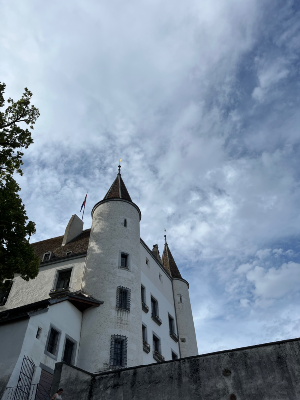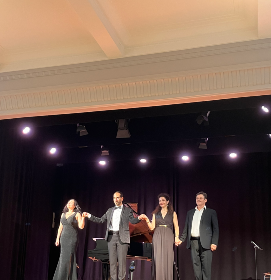Lebanon: Switzerland of the Middle East
During my first week, our office director offered to show me a nearby Lebanese restaurant during the lunch break. My interest in the Middle East began through learning of my grandfather's immigration from Lebanon. The director had remembered this from my interview and was excited to show me the best Lebanese food within walking distance. Since then, I noticed that there were many Lebanese restaurants and shops scattered throughout the area. Out of curiosity, I began looking for an explanation for the apparent Lebanese diaspora. I found that Lebanon is often referred to as the "Switzerland of the Middle East." The explanation is multifaceted, with simple similarities such as flourishing chocolate and skiing industries, as well as parallel policies regarding banking, pluralism, and international relations.
Swiss banks are notorious for enabling tax evasion and other financial crimes. When powerful individuals began storing their funds in Switzerland because its neutrality promised stability, Switzerland capitalized on the economic benefits and actively encouraged such investments with banking secrecy laws. Lebanon sought to build its economy through a similar rationale, encouraging the deposit of the Gulf States' oil funds with a banking secrecy law.
On a more favorable note, both Switzerland and Lebanon have had to ensure all interests in their pluralistic societies are accounted for. While Switzerland is divided among French, German, and Italian cultures, Lebanon has a notable religious pluralism. In a unique framework, Muslims and Christians must be equally represented in the Lebanese parliament, and the presidency is reserved for a Maronite Christian, the prime ministership for a Sunni Muslim, and the speakership of parliament for a Shia Muslim. Finally, just as Switzerland has been a bastion of peace in Europe, Lebanon has been an intermediary in Middle Eastern affairs by virtue of its war-ridden neighbors. For instance, it has welcomed Palestinian and Syrian refugees from their respective conflicts.
Lebanon's comparison to Switzerland has unraveled in recent years due to its collapsed economy, corrupt politics, and devastating explosion. Nevertheless, Lebanon and Switzerland share an intriguing historical connection, and it felt like I was purposely planted in the middle of it.
On one of my walks around the office, I came across an Arabic bookstore. A bulletin within posted a Lebanese poetry and music event in a nearby town the upcoming weekend! I quickly made plans to attend. When I arrived by train, I was greeted by a quaint, hilly town, providing a picturesque view of the lake. I wandered the cobblestone streets lined with arts vendors and discovered a 12th-century castle before settling into the event venue. Lebanese classical music was performed by artists from Beirut. Lyrical pieces spoke of Lebanon's beauty from a place of longing, whether because the recent tragedies have robbed the country of its physical glory or have caused many to emigrate. Poetry from Kahlil Gibran, the late Lebanese-American poet, was interspersed throughout. The event was organized by a Swiss nonprofit that was founded in the aftermath of the Beirut explosion to provide medical care to Lebanese patients who cannot afford it. I left feeling so fulfilled—while it is a dream of mine to visit the Middle East, I have been given plentiful opportunities already to connect to the region's culture through an unexpected European connection.
I have enjoyed taking time here to cultivate my interests by studying Arabic and researching what an international career might look like. In the process, I discovered that a Lebanese law was passed in 2015 that allows foreigners of Lebanese origin to obtain citizenship through a paternal link. I eagerly began reaching out to family members to obtain the necessary documents with the hope of applying soon! I am excited for the opportunities this would open for me and my family, and I am grateful for how Geneva has unconventionally brought my attention to this.

